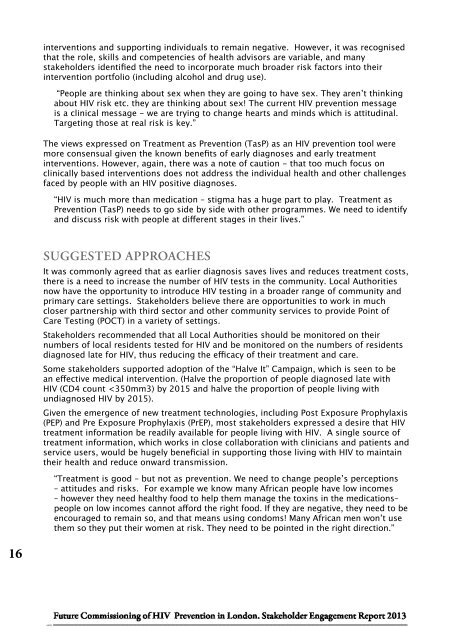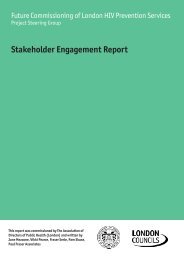Stakeholder Engagement Report - London Councils
Stakeholder Engagement Report - London Councils
Stakeholder Engagement Report - London Councils
Create successful ePaper yourself
Turn your PDF publications into a flip-book with our unique Google optimized e-Paper software.
interventions and supporting individuals to remain negative. However, it was recognised<br />
that the role, skills and competencies of health advisors are variable, and many<br />
stakeholders identified the need to incorporate much broader risk factors into their<br />
intervention portfolio (including alcohol and drug use).<br />
“People are thinking about sex when they are going to have sex. They aren’t thinking<br />
about HIV risk etc. they are thinking about sex! The current HIV prevention message<br />
is a clinical message - we are trying to change hearts and minds which is attitudinal.<br />
Targeting those at real risk is key.”<br />
The views expressed on Treatment as Prevention (TasP) as an HIV prevention tool were<br />
more consensual given the known benefits of early diagnoses and early treatment<br />
interventions. However, again, there was a note of caution - that too much focus on<br />
clinically based interventions does not address the individual health and other challenges<br />
faced by people with an HIV positive diagnoses.<br />
“HIV is much more than medication – stigma has a huge part to play. Treatment as<br />
Prevention (TasP) needs to go side by side with other programmes. We need to identify<br />
and discuss risk with people at different stages in their lives.”<br />
Suggested Approaches<br />
It was commonly agreed that as earlier diagnosis saves lives and reduces treatment costs,<br />
there is a need to increase the number of HIV tests in the community. Local Authorities<br />
now have the opportunity to introduce HIV testing in a broader range of community and<br />
primary care settings. <strong>Stakeholder</strong>s believe there are opportunities to work in much<br />
closer partnership with third sector and other community services to provide Point of<br />
Care Testing (POCT) in a variety of settings.<br />
<strong>Stakeholder</strong>s recommended that all Local Authorities should be monitored on their<br />
numbers of local residents tested for HIV and be monitored on the numbers of residents<br />
diagnosed late for HIV, thus reducing the efficacy of their treatment and care.<br />
Some stakeholders supported adoption of the “Halve It” Campaign, which is seen to be<br />
an effective medical intervention. (Halve the proportion of people diagnosed late with<br />
HIV (CD4 count




